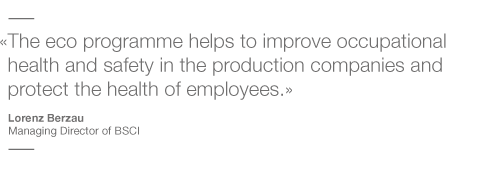Product safety is the top priority
Migros does everything possible to ensure that its products are safe and the health of its customers is not harmed. This also includes identifying risky products as early as possible and reacting quickly to new scientific findings.
Together with its suppliers, Migros ensures the safety of its customers. The use and disposal of products is also strictly monitored. The retailer adheres to all food and product safety laws when introducing and selling products as well as afterwards. Furthermore, the company has introduced a range of more stringent internal regulations, which include continuously carrying out risk-based inspections of the products. Migros also exercises care when it comes to data protection: customer data is subject to strict internal rules for privacy protection.
Rigorous controls
To guarantee the safety of its foods, Migros abides by the Global Food Safety Initiative (GFSI). Most domestic and foreign suppliers of processed foods are certified according to a standard recognised by the GFSI, as are the company's own industrial enterprises. The implementation rate has been around 95% for several years. Food products are also monitored on a continuous basis. Swiss Quality Testing Services (SQTS) is a Migros company which performs risk-based tests on products as part of self-regulation. The products are randomly tested as soon as they are added to the range. In 2012 Migros conducted a total of 20'000 product tests; nine products had to be recalled due to deficiencies. Product recalls are performed in the Migros media and on the government portal. People who use the CUMULUS card when shopping are notified directly in writing.
Early warning system for risks
As part of its quality management framework, Migros has an early warning system in place. This ensures that the company is able to quickly recognise harmful substances, new legal requirements or new scientific findings affecting product safety and to react in a timely manner. If required, Migros defines internal regulations, seeks additional clarification or introduces process changes.
Packaging is under particular scrutiny at present, due to substances from packaging materials being transferred to products on various occasions recently. In 2012 Migros, together with the IG DHS and the Federal Office of Public Health, defined measures to prevent the contamination of tinned food by paint residue (Cyclo-di-BADGE). It also takes a forward-looking approach with its textiles: the Migros Eco standard stands for environmentally friendly, pollutant-free textile production as well as safe and healthy working conditions. All production stages and products can be traced all the way back to their origin. These requirements already apply for two thirds of Migros clothes. By the end of 2017, all own brand textiles will be produced fully in accordance with the strict Eco standard. Migros is thereby already implementing what Greenpeace is demanding in its Detox campaign: textile production without critical substances.

Transparent declaration
Transparency is one of the most important business principles of Migros. For example, information about the country of origin is included on all packaging. Some products can even be traced back to the producer – such as eggs and UTZ coffee and cocoa. Furthermore, Migros made the decision in 2012 to identify products from occupied territories, such as the Middle East. Settlements in such areas contravene international law according to the UN and the Swiss Federal Council. For several years now, Migros' website has been publishing a list of all products that contain nano particles.
Cosmetics from Mibelle AG are being continuously adapted to the declaration requirements for nano products, which will apply in the EU from mid-2013. Products with nanotechnology can therefore be recognised easily by customers. Migros also plays a big role in the introduction of new, globally harmonised risk symbols for chemicals. It supported the Federal Office of Public Health's information campaign for the new hazard designations, which affect around 9'000 of its products.
Strict data protection
When handling customer data as part of the Cumulus bonus programme, Migros has strict internal rules in place to protect the privacy of customers which go beyond the legal requirements. The bonus programme has been awarded the «GoodPriv@cy» quality seal of the Swiss Association for Quality and Management Systems. An annual audit checks whether the rules are being adhered to. Migros also stores personal data securely at all times, such as in relation to newsletter subscriptions.